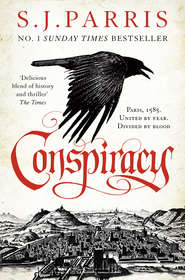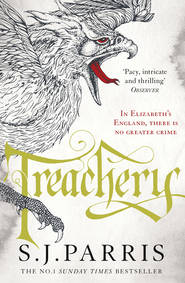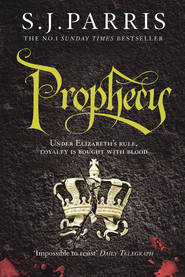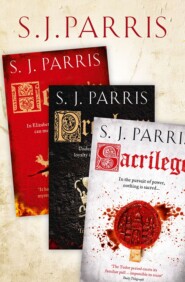По всем вопросам обращайтесь на: info@litportal.ru
(©) 2003-2025.
✖
Heresy
Автор
Год написания книги
2019
Настройки чтения
Размер шрифта
Высота строк
Поля
I looked up and met Doctor William Bernard’s eye. This spiky and gnomic old man gave the distinct and alarming impression of being able to read the secret thoughts of others, and he was nearer to the truth than I liked, so I merely inclined my head and searched for a distraction as his pale grey eyes continued to bore into me. Fortunately, one was provided by the arrival of servants bearing plates laden with the first course: boiled capons with damsons and calves’-foot jelly accompanied by a good claret.
As they bustled around the table, heaping our plates from each dish, I leaned forward with the intention of engaging Sophia Underhill in conversation, but at the same moment the bearded man opposite addressed me, and I saw Florio take the opportunity to claim the girl’s attention.
‘Roger Mercer, Doctor of Divinity and sub-rector of the college,’ the bearded man said in a rich baritone, with an accent that I believed came from the west parts of England. He extended a hand across the table. ‘We are indeed glad to make your acquaintance, Doctor Bruno, and there has been much anticipation here for your disputation with the rector tomorrow night.’
‘Now, now, Roger,’ said the rector hastily, ‘there is to be no talk of any matter touching the disputation at table. My esteemed guest and I must preserve our arguments for the debating chamber, is that not so, Doctor Bruno? We must, as they say, keep our powder dry.’
I nodded my assent. Roger Mercer held up his hand in protest.
‘Fear not, Rector – I spoke only as a prelude to telling Doctor Bruno how I have been curious to meet him since I read his book, On the Shadows of Ideas, that was published in Paris last year.’
‘Did not the sorcerer Cecco d’Ascoli, who was burned for necromancy, make mention of a book with the same title, a book of forbidden magic which he attributed to Solomon?’ Doctor Bernard leaned around Sophia once more to make this interjection, his trembling extended finger pointing almost in her face, though aimed at me. She moved her chair backwards to accommodate him, flicking her hair over one shoulder while continuing her conversation with the irrepressibly enthusiastic Florio. From the odd phrase I could catch, he appeared to be treating her to further rhyming aphorisms. Reluctantly I turned my attention back to Bernard.
‘The book Cecco mentions has never been found,’ I said, raising my voice so that the old man might hear me clearly. ‘It seemed a shame to waste a good title, so I borrowed it. But mine is a treatise on the art of memory, based on the memory systems of the Greeks – no necromancy, gentlemen.’ I laughed, perhaps too hard.
Roger Mercer eyed me thoughtfully.
‘And yet, Doctor Bruno, your memory system makes use of images that seem to correspond precisely to the talismanic figures described by Agrippa in his De Occulta Philosophia, that he claims can be invoked in the rituals of celestial magic to draw down the powers of angels and demons.’
‘But these are images that correspond to the signs of the zodiac and the mansions of the moon, familiar to many mnemonic systems,’ I said, hoping not to betray my unease. ‘They are popular because they are based on regular numerical divisions, which aids in recall, but in the end they are merely images.’
‘Nothing is merely an image to the magician,’ Bernard snapped back. ‘All are signs pointing to hidden realities, as your title implies. Especially those images derived from the ancient astrology of the Egyptians – as Agrippa well knew, for he was quoting from his master, Hermes Trismegistus, who was condemned by St Augustine for summoning demons!’
His voice rose on this last word; a cold hand gripped the base of my spine. I drew myself up to answer, but before I could speak, Sophia Underhill pulled her chair nearer to the table, looked directly at me and asked, cutting off Florio in mid-sentence,
‘Who is Hermes Trismegistus?’
The company fell silent; all eyes turned to me.
‘I have read passing reference to his name in works of philosophy,’ she continued, with an innocence I did not quite believe, ‘but I can find none of his books in our library here, and I don’t have permission to enter the university libraries.’
‘Nor should you, since you are not a scholar,’ chided her father, looking around the table as if embarrassed by her boldness. ‘I permit you to improve your mind by reading in our library as long as you keep your studies to what is fit for a lady’s understanding.’
I felt he said this for the benefit of the company; Sophia appeared about to protest, but then swallowed her words into a petulant expression. Her mother tutted again, loudly.
‘You will find no works of Hermes the Thrice-Great in Oxford now,’ Bernard said in a sonorous voice, shaking his head. ‘Before, we had them – before the great purge of the libraries in ’69. Translated out of the Greek by the Florentine Ficino a century ago, at the dying request of Cosimo de’ Medici. You know Ficino’s version, Doctor Bruno?’
‘I have read Ficino’s translation,’ I said. ‘But I have also read the original Greek manuscripts, though the collection is incomplete. The fifteenth book was lost. Do you read Greek, Doctor Bernard?’
Bernard fixed me with those bright, accusing eyes.
‘Yes, I read Greek, young man, we are not all barbarians north of the Tiber. But the missing book is a myth – it never existed,’ he added briskly. Then he went on, in a softer tone, ‘I read Ficino too, when I was young, and Agrippa. There was not such a fear of the ancient writers then. But so many books are lost to us now, carried off by the tides of reform. Centuries of learning, burned to ashes.’ He tailed off and it seemed he had travelled deep into memory.
‘Doctor Bernard,’ said the rector, a warning note in his voice again, ‘you know very well that the Royal Commission of ’69 was sent to seek out heretical books acquired in the old monastic times, lest they infect the minds of our young men with their unholy ideas – a danger we senior Fellows must guard against still. I am sure you would not wish to disagree with such a prohibition.’
Bernard gave a short, croaking laugh. ‘Books prohibited to scholars? How then should men of learning sharpen their intellect, or learn to discern between truth and heresy? And do those who proscribe not have the wit to realise that forbidden books lure men more potently than the lewdest temptress?’ Here he cast a sideways glance at Sophia. ‘Oh yes – but a forbidden book will always find its way in through the cracks and the mouseholes, do you not know that, Rector? If one only knows where to look.’ He cackled to himself as if this were a great joke, and I noticed his fellow scholars were shifting uncomfortably in their seats.
‘What happened to the books that were purged from the libraries then?’ I asked, perhaps too urgently, for my question seemed to provoke a sudden hostility from Bernard; his eyes narrowed and he pulled himself stiffly upright.
‘It was a long time ago,’ he said brusquely. ‘Burned or taken away by the authorities – who knows? I am old now, and I have forgotten those days.’
He did not quite meet my gaze and I knew he was lying; a man who spoke so passionately about books one moment would surely have remembered a public bonfire of them, even if it had occurred many years ago. But if the forbidden books were not burned, they must have passed into someone’s hands, and I wondered if the old man knew whose.
‘Doctor Bruno, you have still not answered my question,’ Sophia cut in, leaning across to tap my hand while fixing me with her wide-set, tawny eyes. The hint of a smile played around her full mouth, as if she too knew a great joke and was considering letting us in on it. ‘Who was he?’
I took a deep breath, and returned her expectant gaze as steadily as I could, aware that the whole table had fallen silent, awaiting my answer, and that there was every chance my next words might be considered blasphemy.
‘Hermes Trismegistus, called the Thrice-Great, was an Egyptian high priest of great antiquity,’ I began, turning over a piece of bread in my fingers. ‘He lived after the time of Moses, long before Plato or Christ. Some say he was the Egyptian god Thoth, the divinity of wisdom. In any case, he was a man of unusual insight who achieved, through profound contemplation of the cosmos and experimentation with the properties of the natural world, the wisdom to unlock the secrets written in the book of nature and the heavens. He claimed to have entered and understood the Divine Mind.’ I paused. ‘He claimed he could become equal to God.’
Here there was a collective gasp from around the table; these men knew that this was indeed dangerous ground to tread, and I quickly added,
‘He is called the first philosopher, the first theologian, and he was also a prophet – Lactantius credited him with foretelling the advent of the Christian faith, in the very words of the gospel.’
‘And Augustine said he had his foreknowledge from the Devil,’ Roger Mercer said eagerly, his face reddening further as half-chewed meat fell from his mouth and lodged in his beard, though he appeared not to notice. ‘For does Hermes not write of how the Egyptians animated the idols of their gods in magical rites by calling down the powers of demons?’
‘I have never believed the account of the demons and the statues,’ I said lightly. ‘Men have always created mechanical toys and automatons and claimed to have endowed them with the gift of life, like the brazen head possessed by Roger Bacon that was reported to prophesy. But this is merely conjuring and skilled craftsmanship.’
‘Hermes Trismegistus was no magician, then?’ Sophia said softly, still looking at me. She seemed disappointed.
‘He wrote at length on the hidden properties of plants and stones and the arrangement of the cosmos,’ I replied. ‘There are some who call this alchemy or natural magic, and others who call it scientific enquiry.’
‘When it is done for the purpose of seeking forbidden powers, it is called sorcery,’ the rector put in, sternly.
‘But did he discover any magic that worked?’ she persisted, ignoring her father.
‘How do you mean, worked?’ I asked.
‘I mean, was he able to use this natural magic to influence the world – to change people’s thoughts or deeds, for example, and did he write of how it is done?’ Her eyes were bright and impatient now as she leaned closer.
‘Recipes for spells, you mean?’ I laughed. ‘I’m afraid not. The Hermetic magic, if you want to give it that name, is concerned with teaching the adept how to penetrate the mysteries of the universe through the light of the intellect. He cannot teach you how to make your sweetheart fall in love with you or keep him true – for that you had better consult some village wise-woman.’
There was some amusement at this from those at our end of the table, but the girl coloured violently and I suspected that my joke had accidentally struck the truth, so to cover her embarrassment I continued, hastily:
‘But the German alchemist Henry Cornelius Agrippa does speak of such things, in his treatise on the occult sciences that Doctor Mercer mentioned earlier. He writes that, as well as the celestial images used in magic, we may create our own fitting to our purpose. For example, he says that to procure love, we may create an image of people embracing.’
‘But how –’ Sophia began, just as the rector coughed loudly and the servants entered to clear away the first course.
‘Well, this has been a most illuminating discussion, Doctor Bruno – I knew your conversation and your unusual ideas would enliven our little college society,’ the rector said, patting me on the shoulder with considerable insincerity. ‘But I have devised that we should all change places for each course, so that you may become acquainted with some of the other important officials of the college. Much as I would like to continue with our theme …’ he added.
Now he rose from his seat and fussed around the table, officiously rearranging the seating plan so that I found myself at the opposite end, surrounded by the three men to whom I had not yet spoken. The servants brought in silver dishes steaming with richly scented beef and a stew of vegetables, and in the course of all this activity, the rector’s wife, who had barely spoken, took the opportunity to excuse herself with a headache, apologising profusely to me for being such a poor hostess. She seemed a melancholic and sickly woman, but I recalled what the rector had told me about their son; I had seen such symptoms previously in women who had lost a child, often years after the death, as if the mind itself had taken some wasting sickness from which it could not recover, and I felt profoundly sorry for her. It was hard to credit that such a forlorn creature could have been the author of the lively girl at the other end of the table.
The second half of the meal passed with considerably less interest than the first, now that I had been removed from Sophia’s company. My new dining companions introduced themselves: opposite me sat Master Walter Slythurst, the college bursar, a bony, thin-lipped man of my own age with narrow, suspicious eyes and lank hair that fell in curtains around his face. Beside him was Doctor James Coverdale, a plump man of about forty with a great sweep of dark hair, a close-cropped beard and an air of complacency, who explained that he was the proctor, the official responsible for the students’ discipline. To my right was Master Richard Godwyn, the librarian, who appeared older, perhaps fifty, and whose large, drooping features reminded me of a bloodhound, as though his skin were too big for his face, though his gloomy countenance was transformed when he allowed a brief smile to illuminate it as he shook my hand. All were courteous enough, but I could not help but wish I had been allowed to continue my discussion with Sophia. It was clear that the tenor of our conversation had angered her father; she was now seated next to him, on the same side of the table as me, so that I could not see her without rudely leaning around my neighbour Godwyn and drawing attention to myself.
‘I fear you have had to suffer the sharp end of William Bernard’s tongue up there, Doctor Bruno,’ said James Coverdale, leaning across the table.
‘He seems disappointed with the world as he finds it,’ I observed, checking to see that Bernard had been moved far enough away to be out of earshot.
‘It is often the way with old men,’ Godwyn said, with a sombre nod. ‘He has weathered a great many changes in his seventy winters, it cannot be easy.’











